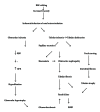Outcome and challenges of kidney transplant in patients with sickle cell disease
- PMID: 23691273
- PMCID: PMC3649443
- DOI: 10.1155/2013/614610
Outcome and challenges of kidney transplant in patients with sickle cell disease
Abstract
Sickle cell nephropathy is a common presentation in patients with sickle cell disease. End-stage kidney disease is the most severe presentation of sickle cell nephropathy in terms of morbidity and mortality. Sickle cell disease patients with end-stage kidney disease are amenable to renal replacement therapy including kidney transplant. Kidney transplant in these patients has been associated with variable outcome with recent studies reporting short- and long-term outcomes comparable to that of patients with HbAA. Sickle cell disease patients are predisposed to various haematological, cardiorespiratory, and immunological challenges. These challenges have the potential to limit, delay, or prevent kidney transplant in patients with sickle cell disease. There are few reports on the outcome and challenges of kidney transplant in this group of patients. The aim of this review is to highlight the outcome and challenges of kidney transplant in patients with sickle cell disease.
Figures
References
-
- Platt OS, Brambilla DJ, Rosse WF, et al. Mortality in sickle cell disease. Life expectancy and risk factors for early death. The New England Journal of Medicine. 1994;330(23):1639–1644. - PubMed
-
- Status van Eps LW. Sickle cell disease. Atlas of kidney disease; CD Rom, pp. 1–22, 2004.
LinkOut - more resources
Full Text Sources
Other Literature Sources


